COVID-19 'Pandemic'
- Thread starter Ocean Breeze
- Start date
You are using an out of date browser. It may not display this or other websites correctly.
You should upgrade or use an alternative browser.
You should upgrade or use an alternative browser.
No evidence to show AstraZeneca vaccine causes clots, says UK regulator
Countries should continue to use the vaccine, the World Health Organisation (WHO) has said, adding there was no indication of a link between the jabs and blood clots.No evidence to show AstraZeneca vaccine causes clots, says UK regulator | ITV News
Ireland has suspended use of the jab out of an abundance of caution, after a small number of reports associated with blood clots were recorded. | ITV National News
The right to protest could be lost forever
Lockdown has emboldened the state to trample over our most basic freedoms.

LUKE GITTOS
The Police, Crime, Sentencing and Courts Bill has its first debate in parliament this week. The bill has been widely condemned as an attack on freedom of assembly and protest. Its passage through parliament follows the heavy-handed policing of the vigil for Sarah Everard on Clapham Common on Saturday night.
The bill seeks to amend the Public Order Act 1986 by expanding the circumstances in which the police can impose restrictions on demonstrations. The police will now be able to restrict protest where ‘the noise generated by persons taking part in the procession may result in serious disruption to the activities of an organisation in the vicinity of the procession’. Restrictions could also be imposed if the ‘noise generated by persons taking part… may result in the intimidation or harassment of persons of reasonable firmness’ or ‘may cause such persons to suffer serious unease, alarm or distress’. In other words, the police can intervene to stop a protest if there is even a risk that people in the vicinity could be upset by the noise.
The bill is obviously an egregious attack on the freedom to protest. The threshold for intervening against protestors will become absurdly low. As others have pointed out, the bill attacks the very purpose of demonstrations. Demonstrations are supposed to cause ‘upset’ and ‘unease’. It is hard to imagine how any protest could be effective under these restrictions.
It is also worth noting how the bill uses established legalese to justify the expansion of state power. The appeal to ‘harassment alarm and distress’ reflects the wording of Sections 4a and 5 of the 1986 Public Order Act, which has been used repeatedly by the police to criminalise speech in the past. When it comes to policing free expression, this bill certainly plays by an established playbook.
This proposed clampdown on protest is the government’s most blatant attempt to make certain aspects of the lockdown permanent. Some pro-lockdown commentators have tried to argue over the weekend that the Coronavirus Act contains no explicit, blanket ban on the right to protest. But this is academic. Citizens have already been handed huge fines for organising protests. Earlier this month, a nurse was fined £10,000 for protesting against the government’s one per cent pay rise for NHS workers. Anti-lockdown protesters have been arrested, prosecuted and fined for organising and attending demonstrations throughout the pandemic. Now, with this bill, the government is attempting to put this power to police protest on a permanent statutory footing.
We should hardly be surprised. Those sceptical of the lockdown were never rallying against the restrictions for the sake of it. We recognised that it was dangerous to hand the state such untrammeled power, because it sets a dangerous precedent. Can we really be surprised that a government which has previously sought to make ‘mingling’ illegal now feels emboldened to permanently ban protests? This bill gives a strong indication that the government is seeking to turn some ‘emergency powers’ into permanent incursions on our civil liberties.
But it is not just the government at fault here. The total abandonment of civil liberties by the opposition, civil society and swathes of the commentariat since the onset of the pandemic has created the conditions for this draconian lawmaking.
We can only hope that this bill serves as a wake-up call. It is now clear that unless we push back against the lockdown, there is a real risk that this loss of freedom will be made permanent. We must now make the case for freedom in the strongest possible terms. We have to protest against the anti-protest bill.
Luke Gittos is a spiked columnist and author. His latest book, Human Rights – Illusory Freedom: Why We Should Repeal the Human Rights Act, is published by Zero Books. Order it here.
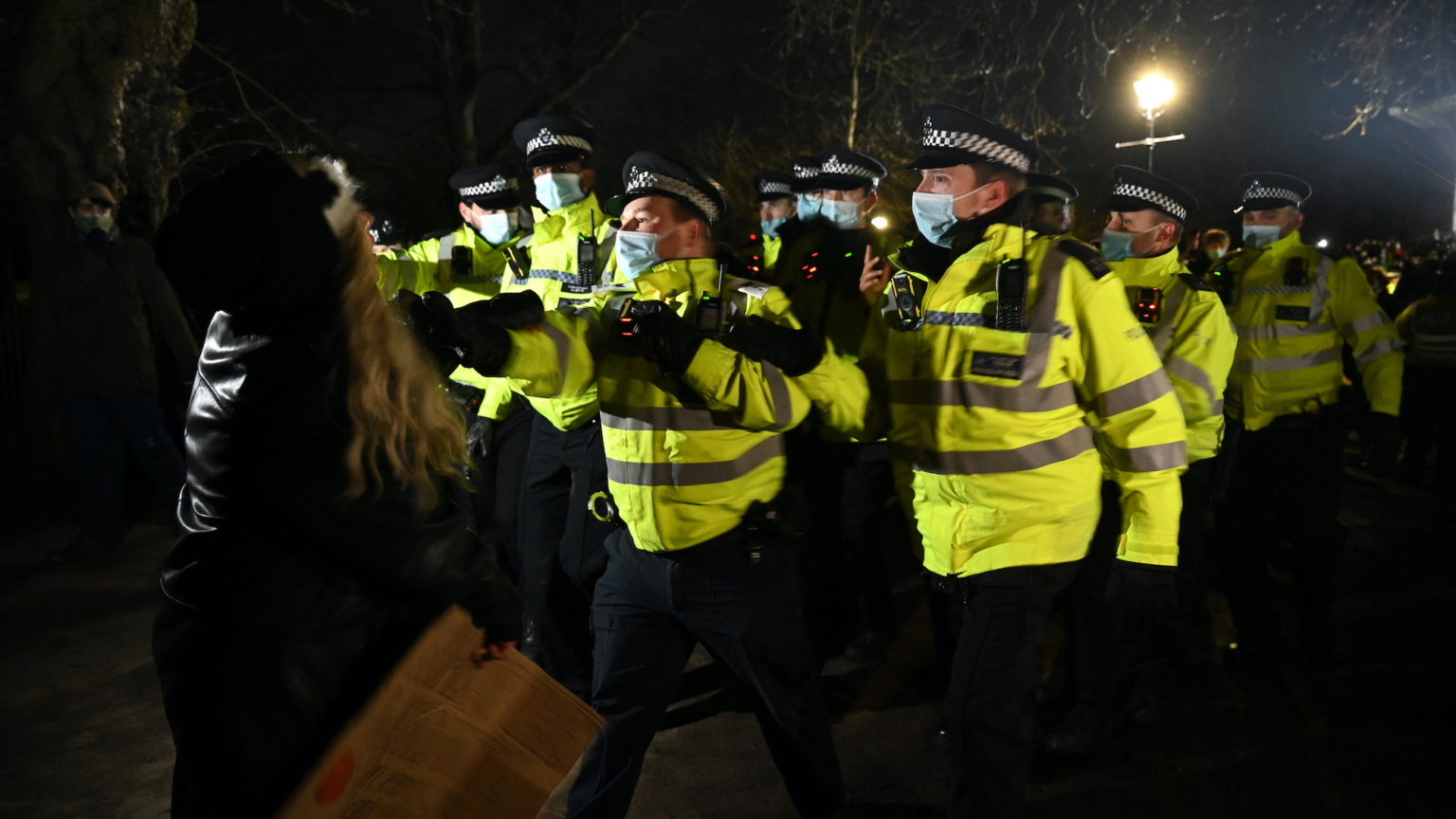
 www.spiked-online.com
www.spiked-online.com
Lockdown has emboldened the state to trample over our most basic freedoms.

LUKE GITTOS
COLUMNIST
15th March 2021
SpikedThe Police, Crime, Sentencing and Courts Bill has its first debate in parliament this week. The bill has been widely condemned as an attack on freedom of assembly and protest. Its passage through parliament follows the heavy-handed policing of the vigil for Sarah Everard on Clapham Common on Saturday night.
The bill seeks to amend the Public Order Act 1986 by expanding the circumstances in which the police can impose restrictions on demonstrations. The police will now be able to restrict protest where ‘the noise generated by persons taking part in the procession may result in serious disruption to the activities of an organisation in the vicinity of the procession’. Restrictions could also be imposed if the ‘noise generated by persons taking part… may result in the intimidation or harassment of persons of reasonable firmness’ or ‘may cause such persons to suffer serious unease, alarm or distress’. In other words, the police can intervene to stop a protest if there is even a risk that people in the vicinity could be upset by the noise.
The bill is obviously an egregious attack on the freedom to protest. The threshold for intervening against protestors will become absurdly low. As others have pointed out, the bill attacks the very purpose of demonstrations. Demonstrations are supposed to cause ‘upset’ and ‘unease’. It is hard to imagine how any protest could be effective under these restrictions.
It is also worth noting how the bill uses established legalese to justify the expansion of state power. The appeal to ‘harassment alarm and distress’ reflects the wording of Sections 4a and 5 of the 1986 Public Order Act, which has been used repeatedly by the police to criminalise speech in the past. When it comes to policing free expression, this bill certainly plays by an established playbook.
This proposed clampdown on protest is the government’s most blatant attempt to make certain aspects of the lockdown permanent. Some pro-lockdown commentators have tried to argue over the weekend that the Coronavirus Act contains no explicit, blanket ban on the right to protest. But this is academic. Citizens have already been handed huge fines for organising protests. Earlier this month, a nurse was fined £10,000 for protesting against the government’s one per cent pay rise for NHS workers. Anti-lockdown protesters have been arrested, prosecuted and fined for organising and attending demonstrations throughout the pandemic. Now, with this bill, the government is attempting to put this power to police protest on a permanent statutory footing.
We should hardly be surprised. Those sceptical of the lockdown were never rallying against the restrictions for the sake of it. We recognised that it was dangerous to hand the state such untrammeled power, because it sets a dangerous precedent. Can we really be surprised that a government which has previously sought to make ‘mingling’ illegal now feels emboldened to permanently ban protests? This bill gives a strong indication that the government is seeking to turn some ‘emergency powers’ into permanent incursions on our civil liberties.
But it is not just the government at fault here. The total abandonment of civil liberties by the opposition, civil society and swathes of the commentariat since the onset of the pandemic has created the conditions for this draconian lawmaking.
We can only hope that this bill serves as a wake-up call. It is now clear that unless we push back against the lockdown, there is a real risk that this loss of freedom will be made permanent. We must now make the case for freedom in the strongest possible terms. We have to protest against the anti-protest bill.
Luke Gittos is a spiked columnist and author. His latest book, Human Rights – Illusory Freedom: Why We Should Repeal the Human Rights Act, is published by Zero Books. Order it here.

The right to protest could be lost forever
Lockdown has emboldened the state to trample over our most basic freedoms.
Model turns to OnlyFans to help pay parents' rent
Author of the article ostmedia News
ostmedia News
Publishing date:Mar 15, 2021 • 1 hour ago • 1 minute read • comment bubbleJoin the conversation
An image of Alexis Griswold posted to her Instagram account.
An image of Alexis Griswold posted to her Instagram account. PHOTO BY @LEXIGRISWOLD /Instagram
Article content
A Los Angeles-based model has turned to OnlyFans to help her parents with rent.
In an interview with LADbible, model/influencer Alexis Griswold says she joined OnlyFans this past December after the COVID-19 pandemic made getting sponsorship deals difficult. She says she’s using some of the cash she makes off the site to help keep a roof over her parents’ heads.
Griswold is supported by her more than 600 followers who shell out $17 a month to see the model in various states of undress. The model also has quite the following on other social media platforms, including 473,000 followers on TikTok and 213,000 on Instagram.
Advertisement
STORY CONTINUES BELOW
This advertisement has not loaded yet, but your article continues below.
Article content
“I do help my parents out and send them money,” Griswold told LADbible.
Griswold told the Daily Star her OnlyFans venture hasn’t caused any strain with her family.
“My family, luckily, is really supportive,” she said. “And they just trust my judgment and how I like to present myself, and they’re really supportive of it. So I’m grateful for that.”
While helping her parents out financially has been rewarding for Griswold, her modelling work hasn’t come without criticism because of OnlyFans’ reputation for being an adult site.
“It kind of started off as more of a sexual thing, rather than a fan base platform like it was supposed to be — it kind of got turned into something else,” she told LADbible.
Griswold said maintaining an OnlyFans account is “a lot more work than what people think it’s like,” noting it’s not like a nine-to-five job, rather “you have to put in the work yourself, and it’s all on you.”

Instagram
 instagram.com
instagram.com
Instagram
 instagram.com
instagram.com

 ladbible.com
ladbible.com

 dailystar.co.uk
dailystar.co.uk

 torontosun.com
torontosun.com
Author of the article
Publishing date:Mar 15, 2021 • 1 hour ago • 1 minute read • comment bubbleJoin the conversation
An image of Alexis Griswold posted to her Instagram account.
An image of Alexis Griswold posted to her Instagram account. PHOTO BY @LEXIGRISWOLD /Instagram
Article content
A Los Angeles-based model has turned to OnlyFans to help her parents with rent.
In an interview with LADbible, model/influencer Alexis Griswold says she joined OnlyFans this past December after the COVID-19 pandemic made getting sponsorship deals difficult. She says she’s using some of the cash she makes off the site to help keep a roof over her parents’ heads.
Griswold is supported by her more than 600 followers who shell out $17 a month to see the model in various states of undress. The model also has quite the following on other social media platforms, including 473,000 followers on TikTok and 213,000 on Instagram.
Advertisement
STORY CONTINUES BELOW
This advertisement has not loaded yet, but your article continues below.
Article content
“I do help my parents out and send them money,” Griswold told LADbible.
Griswold told the Daily Star her OnlyFans venture hasn’t caused any strain with her family.
“My family, luckily, is really supportive,” she said. “And they just trust my judgment and how I like to present myself, and they’re really supportive of it. So I’m grateful for that.”
While helping her parents out financially has been rewarding for Griswold, her modelling work hasn’t come without criticism because of OnlyFans’ reputation for being an adult site.
“It kind of started off as more of a sexual thing, rather than a fan base platform like it was supposed to be — it kind of got turned into something else,” she told LADbible.
Griswold said maintaining an OnlyFans account is “a lot more work than what people think it’s like,” noting it’s not like a nine-to-five job, rather “you have to put in the work yourself, and it’s all on you.”

 instagram.com
instagram.com
 instagram.com
instagram.com

OnlyFans Influencer Uses Money To Help Pay Parents' Rent
Alexis Griswold already has a huge following on TikTok and Instagram

Model sells racy OnlyFans snaps to help pay for parents' rent
OnlyFans model, decided to join OnlyFans in September after the coronavirus pandemic made it harder for her to pick up influencer brand deals - and now she's helping to pay her parents' rent

Model turns to OnlyFans to help pay parents' rent
Alexis Griswold says she joined OnlyFans this past December after the COVID-19 pandemic made getting sponsorship deals difficult
South Korean province orders COVID testing for foreigners, sparking complaints of xenophobia
Author of the article:Reuters
Reuters
Josh Smith and Sangmi Cha
Publishing date:Mar 15, 2021 • 7 hours ago • 3 minute read • comment bubbleJoin the conversation
Medical workers wait to receive the first dose of the Pfizer BioNTech vaccine Covid-19 at the National Medical Center vaccination center on February 27, 2021 in Seoul, South Korea. South Korea started its first inoculation program against the new coronavirus over one year after its first confirmed case, as health authorities hope to attain herd immunity by November.
Medical workers wait to receive the first dose of the Pfizer BioNTech vaccine Covid-19 at the National Medical Center vaccination center on February 27, 2021 in Seoul, South Korea. South Korea started its first inoculation program against the new coronavirus over one year after its first confirmed case, as health authorities hope to attain herd immunity by November. PHOTO BY POOL /Getty Images
Article content
ANSAN — South Korea’s most populous province has ordered all of its foreign workers to be tested for COVID-19 by March 22, sparking complaints of long lines and logistical problems, as well as of implicit xenophobia in government messaging.
Last week, Gyeonggi province issued a sweeping administrative order mandating all international workers be tested after at least 275 foreigners tested positive, many in outbreaks at manufacturing plants.
The province says the order covers roughly 85,000 registered foreigners as well as an unknown number of potential undocumented workers, while those who don’t comply could face fines of up to 3 million won ($2,640).
Social media lit up with complaints from foreign residents: poor communication by the government, hours-long waits at testing centers where it was difficult to maintain distancing, and other challenges.
At one center in the city of Ansan on Monday, hundreds of people were lined up in a queue that stretched for around 100 meters.
Advertisement
STORY CONTINUES BELOW
This advertisement has not loaded yet, but your article continues below.
Article content
“I agree that everyone should get tested for COVID, but it is so exhausting to wait for hours,” Jin Dianshun, a 65-year-old restaurant worker from China who said she had been standing in line for four hours, after already having stood in line for hours on Saturday before being turned away.
“I am sure Koreans would have protested if this was done the same way for them.”
One health worker at the site, who asked not to be named as they were not authorized to speak to the media, said the temporary center usually handled about 100 people per day, but surged to an average of 1,400 people after the order.
“The problem is that already by 7 a.m. there can be more than 2,000 people waiting in line,” the worker said.
As of Sunday, 120,310 foreigners had been tested, with 120 testing positive, a provincial official told Reuters.
Derval Mambou, a car parts maker from Cameroon, said he welcomed the testing regime.
“They want people living here in Korea to be safe from the coronavirus, even foreigners,” he said as he stood in line.
Some people took the order itself as an invasion of human rights, however.
“I’ve lived in Korea for years, pay a mortgage, run a business, have a family, pay tax,” John, a graphic designer from the United Kingdom who owns his own business and has lived in South Korea for 10 years, told Reuters by online messenger, asking to be identified only by his first name. “Yet they are treating us like we are the problem because of coronavirus. Feels xenophobic and racist.”
Advertisement
STORY CONTINUES BELOW
This advertisement has not loaded yet, but your article continues below.
Article content
Korea Disease Control and Prevention Agency (KDCA) Director Jeong Eun-kyeong said on Monday that the rate of infections among foreign workers was a high-risk situation.
“We don’t think this is to discriminate or stigmatize foreign workers, and it shouldn’t be accepted that way,” she said.
Jeong said the KDCA would work with local governments to improve testing capabilities to resolve the long waits.
One American university professor who has worked in South Korea for 15 years said it made no sense to test people like her – who have been teaching online for almost a year and rarely go out – rather than fixing the workplace safety at factories that had outbreaks.
“There is no reasoning behind forcing foreign workers to take this test,” she said in an email.
In Ansan, some locals denied that there was any racial animosity, but admitted they were reassured by the campaign.
“Since there are a lot of foreigners here, every time a foreigner comes in, it would worry me,” said Hwang Mi-sun, a clothes shop owner. “Now that they are filtering out everyone, it gives me a sense of assurance.”
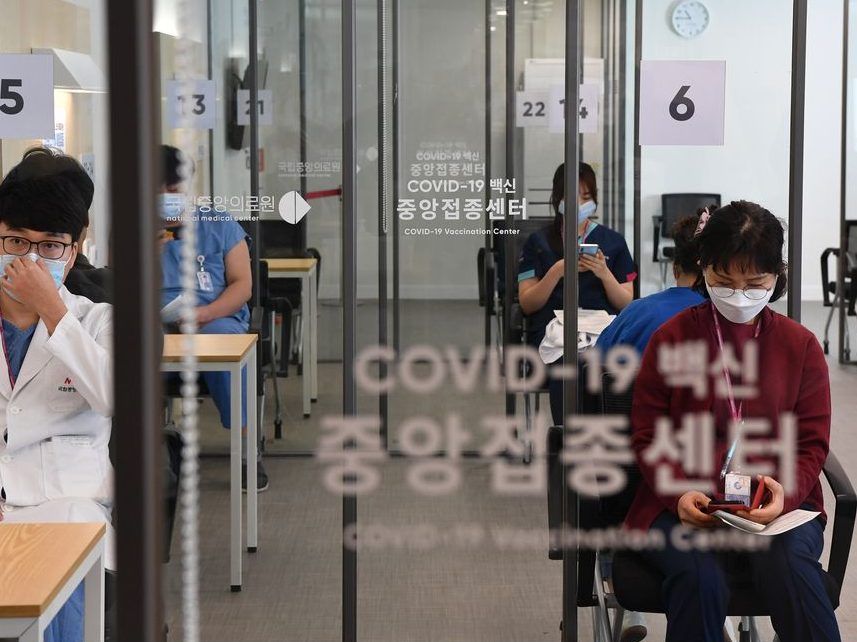
 torontosun.com
torontosun.com
Author of the article:Reuters
Reuters
Josh Smith and Sangmi Cha
Publishing date:Mar 15, 2021 • 7 hours ago • 3 minute read • comment bubbleJoin the conversation
Medical workers wait to receive the first dose of the Pfizer BioNTech vaccine Covid-19 at the National Medical Center vaccination center on February 27, 2021 in Seoul, South Korea. South Korea started its first inoculation program against the new coronavirus over one year after its first confirmed case, as health authorities hope to attain herd immunity by November.
Medical workers wait to receive the first dose of the Pfizer BioNTech vaccine Covid-19 at the National Medical Center vaccination center on February 27, 2021 in Seoul, South Korea. South Korea started its first inoculation program against the new coronavirus over one year after its first confirmed case, as health authorities hope to attain herd immunity by November. PHOTO BY POOL /Getty Images
Article content
ANSAN — South Korea’s most populous province has ordered all of its foreign workers to be tested for COVID-19 by March 22, sparking complaints of long lines and logistical problems, as well as of implicit xenophobia in government messaging.
Last week, Gyeonggi province issued a sweeping administrative order mandating all international workers be tested after at least 275 foreigners tested positive, many in outbreaks at manufacturing plants.
The province says the order covers roughly 85,000 registered foreigners as well as an unknown number of potential undocumented workers, while those who don’t comply could face fines of up to 3 million won ($2,640).
Social media lit up with complaints from foreign residents: poor communication by the government, hours-long waits at testing centers where it was difficult to maintain distancing, and other challenges.
At one center in the city of Ansan on Monday, hundreds of people were lined up in a queue that stretched for around 100 meters.
Advertisement
STORY CONTINUES BELOW
This advertisement has not loaded yet, but your article continues below.
Article content
“I agree that everyone should get tested for COVID, but it is so exhausting to wait for hours,” Jin Dianshun, a 65-year-old restaurant worker from China who said she had been standing in line for four hours, after already having stood in line for hours on Saturday before being turned away.
“I am sure Koreans would have protested if this was done the same way for them.”
One health worker at the site, who asked not to be named as they were not authorized to speak to the media, said the temporary center usually handled about 100 people per day, but surged to an average of 1,400 people after the order.
“The problem is that already by 7 a.m. there can be more than 2,000 people waiting in line,” the worker said.
As of Sunday, 120,310 foreigners had been tested, with 120 testing positive, a provincial official told Reuters.
Derval Mambou, a car parts maker from Cameroon, said he welcomed the testing regime.
“They want people living here in Korea to be safe from the coronavirus, even foreigners,” he said as he stood in line.
Some people took the order itself as an invasion of human rights, however.
“I’ve lived in Korea for years, pay a mortgage, run a business, have a family, pay tax,” John, a graphic designer from the United Kingdom who owns his own business and has lived in South Korea for 10 years, told Reuters by online messenger, asking to be identified only by his first name. “Yet they are treating us like we are the problem because of coronavirus. Feels xenophobic and racist.”
Advertisement
STORY CONTINUES BELOW
This advertisement has not loaded yet, but your article continues below.
Article content
Korea Disease Control and Prevention Agency (KDCA) Director Jeong Eun-kyeong said on Monday that the rate of infections among foreign workers was a high-risk situation.
“We don’t think this is to discriminate or stigmatize foreign workers, and it shouldn’t be accepted that way,” she said.
Jeong said the KDCA would work with local governments to improve testing capabilities to resolve the long waits.
One American university professor who has worked in South Korea for 15 years said it made no sense to test people like her – who have been teaching online for almost a year and rarely go out – rather than fixing the workplace safety at factories that had outbreaks.
“There is no reasoning behind forcing foreign workers to take this test,” she said in an email.
In Ansan, some locals denied that there was any racial animosity, but admitted they were reassured by the campaign.
“Since there are a lot of foreigners here, every time a foreigner comes in, it would worry me,” said Hwang Mi-sun, a clothes shop owner. “Now that they are filtering out everyone, it gives me a sense of assurance.”

South Korean province orders COVID testing for foreigners, sparking complaints of xenophobia
ANSAN — South Korea’s most populous province has ordered all of its foreign workers to be tested for COVID-19 by March 22, sparking complaints of long lines and log…
Dane who died from blood clot after AstraZeneca shot had 'unusual symptoms': Agency
Author of the article:Reuters
Reuters
Publishing date:Mar 15, 2021 • 6 hours ago • 1 minute read • comment bubble30 Comments
Staff member handles AstraZeneca COVID-19 vaccines in storage at Region Hovedstaden's Vaccine Center, Copenhagen, Denmark February 11, 2021.
Staff member handles AstraZeneca COVID-19 vaccines in storage at Region Hovedstaden's Vaccine Center, Copenhagen, Denmark February 11, 2021. PHOTO BY POOL /via REUTERS
Article content
COPENHAGEN — A 60-year old Danish woman who died of a blood clot after receiving AstraZeneca’s COVID-19 vaccine had “highly unusual” symptoms, according to the Danish Medicines Agency.
The woman had a low number of blood platelets and clots in small and large vessels, as well as bleeding, it said.
A few similar cases were found in Norway and in the European Medicines Agency’s (EMA) database of drug side effects, Danish Medicines Agency said.
“It was an unusual course of illness around the death that made the Danish Medicines Agency react,” it said in a statement late on Sunday.
Norway said on Saturday that three people, all under the age of 50, who had received the AstraZeneca vaccine were being treated in hospital for bleeding, blood clots and a low count of blood platelets, which were labelled “unusual symptoms” by health authorities.
Denmark, Norway and Iceland said last week they would halt the introduction of the AstraZeneca vaccine.
European vaccination programs have been upset in the last two weeks by reports that recipients of the AstraZeneca inoculation have suffered blood clots.
The European Medicines Agency has said there is no indication that the events were caused by the vaccination, a view that was echoed by the World Health Organization on Friday.
AstraZeneca Plc said on Sunday a review of safety data of people vaccinated with its COVID-19 vaccine has shown no evidence of an increased risk of blood clots.
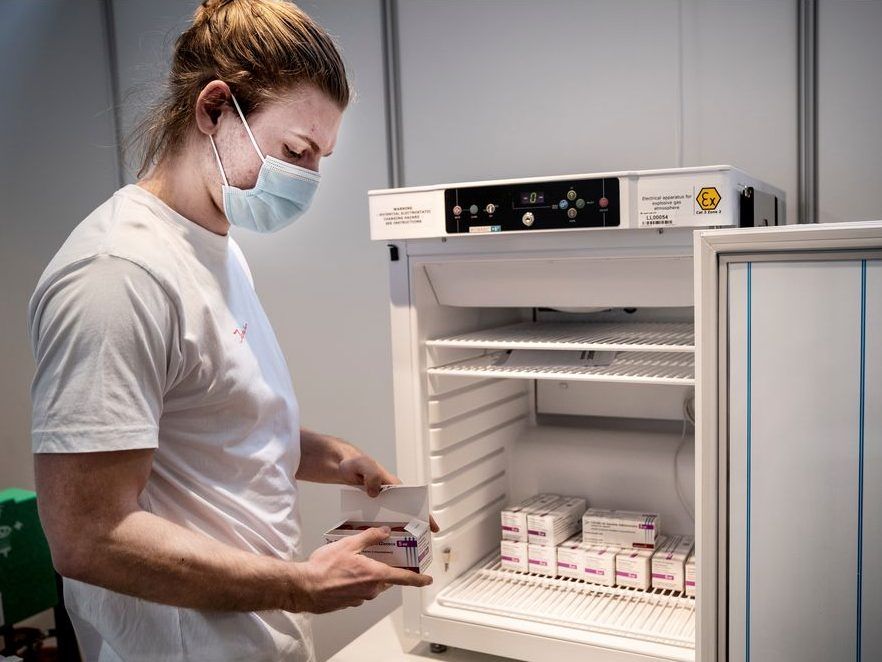
 torontosun.com
torontosun.com
Author of the article:Reuters
Reuters
Publishing date:Mar 15, 2021 • 6 hours ago • 1 minute read • comment bubble30 Comments
Staff member handles AstraZeneca COVID-19 vaccines in storage at Region Hovedstaden's Vaccine Center, Copenhagen, Denmark February 11, 2021.
Staff member handles AstraZeneca COVID-19 vaccines in storage at Region Hovedstaden's Vaccine Center, Copenhagen, Denmark February 11, 2021. PHOTO BY POOL /via REUTERS
Article content
COPENHAGEN — A 60-year old Danish woman who died of a blood clot after receiving AstraZeneca’s COVID-19 vaccine had “highly unusual” symptoms, according to the Danish Medicines Agency.
The woman had a low number of blood platelets and clots in small and large vessels, as well as bleeding, it said.
A few similar cases were found in Norway and in the European Medicines Agency’s (EMA) database of drug side effects, Danish Medicines Agency said.
“It was an unusual course of illness around the death that made the Danish Medicines Agency react,” it said in a statement late on Sunday.
Norway said on Saturday that three people, all under the age of 50, who had received the AstraZeneca vaccine were being treated in hospital for bleeding, blood clots and a low count of blood platelets, which were labelled “unusual symptoms” by health authorities.
Denmark, Norway and Iceland said last week they would halt the introduction of the AstraZeneca vaccine.
European vaccination programs have been upset in the last two weeks by reports that recipients of the AstraZeneca inoculation have suffered blood clots.
The European Medicines Agency has said there is no indication that the events were caused by the vaccination, a view that was echoed by the World Health Organization on Friday.
AstraZeneca Plc said on Sunday a review of safety data of people vaccinated with its COVID-19 vaccine has shown no evidence of an increased risk of blood clots.

Dane who died from blood clot after AstraZeneca shot had 'unusual symptoms': Agency
COPENHAGEN — A 60-year old Danish woman who died of a blood clot after receiving AstraZeneca’s COVID-19 vaccine had “highly unusual” symptoms, according to the Dani…
JetBlue flight diverted after unruly passenger refused to wear mask, stop boozing
Author of the article ostmedia News
ostmedia News
Publishing date:Mar 15, 2021 • 4 hours ago • 1 minute read • comment bubbleJoin the conversation
JetBlue Airways aircrafts are pictured at departure gates at John F. Kennedy International Airport in New York June 15, 2013.
JetBlue Airways aircrafts are pictured at departure gates at John F. Kennedy International Airport in New York June 15, 2013. PHOTO BY FRED PROUSER /REUTERS
Article content
Mask-wearing refusal and excessive drinking apparently went hand-in-hand for a passenger on a JetBlue flight that had to make an emergency landing in New York City.
According to the U.S. Federal Aviation Administration, a man faces a $14,500 fine for allegedly breaching the airline’s policies during a Dec. 23, 2020 flight.
The unruly passenger aboard the Dominican Republic-bound flight was allegedly crowding the passenger beside him and spoke loudly while refusing to wear a face mask, the FAA noted in a March 12 release. Flight attendants moved the uncomfortable passenger to a different seat because of the man’s behaviour.
The man was advised about the airlines’ policies regarding face masks and was warned twice about consuming alcohol he had brought on board.
But the man continued to booze while not wearing a mask. After he was issued a “notice to cease illegal and objectionable behaviour,” the captain decided to turn the plane back to John F. Kennedy International Airport, “where the plane landed 4,000 pounds overweight due to the amount of fuel on board,” according to People.com.
JetBlue’s COVID-19 policies state that mask-wearing is mandatory during flights, while the airline’s Alcohol Guidelines noted passengers may “bring wine, champagne or beer on a flight as long as it is in an unopened container. You are not allowed to consume your own alcohol while on board.”
The unnamed passenger has 30 days to respond to the FAA after receiving its enforcement letter.

 people.com
people.com

 torontosun.com
torontosun.com
Author of the article
Publishing date:Mar 15, 2021 • 4 hours ago • 1 minute read • comment bubbleJoin the conversation
JetBlue Airways aircrafts are pictured at departure gates at John F. Kennedy International Airport in New York June 15, 2013.
JetBlue Airways aircrafts are pictured at departure gates at John F. Kennedy International Airport in New York June 15, 2013. PHOTO BY FRED PROUSER /REUTERS
Article content
Mask-wearing refusal and excessive drinking apparently went hand-in-hand for a passenger on a JetBlue flight that had to make an emergency landing in New York City.
According to the U.S. Federal Aviation Administration, a man faces a $14,500 fine for allegedly breaching the airline’s policies during a Dec. 23, 2020 flight.
The unruly passenger aboard the Dominican Republic-bound flight was allegedly crowding the passenger beside him and spoke loudly while refusing to wear a face mask, the FAA noted in a March 12 release. Flight attendants moved the uncomfortable passenger to a different seat because of the man’s behaviour.
The man was advised about the airlines’ policies regarding face masks and was warned twice about consuming alcohol he had brought on board.
But the man continued to booze while not wearing a mask. After he was issued a “notice to cease illegal and objectionable behaviour,” the captain decided to turn the plane back to John F. Kennedy International Airport, “where the plane landed 4,000 pounds overweight due to the amount of fuel on board,” according to People.com.
JetBlue’s COVID-19 policies state that mask-wearing is mandatory during flights, while the airline’s Alcohol Guidelines noted passengers may “bring wine, champagne or beer on a flight as long as it is in an unopened container. You are not allowed to consume your own alcohol while on board.”
The unnamed passenger has 30 days to respond to the FAA after receiving its enforcement letter.

JetBlue Passenger May Face $14,500 Fine After Allegedly Refusing to Wear Mask, Causing Emergency Landing
The passenger also allegedly refused to stop consuming alcohol he brought on the plane

JetBlue flight diverted after unruly passenger refused to wear mask, stop boozing
According to the FAA, a man faces a $14,500 fine for allegedly breaching the airline's policies during a Dec. 23, 2020 flight.
France to suspend AstraZeneca COVID vaccine pending EMA guidance
Author of the article:Reuters
Reuters
Publishing date:Mar 15, 2021 • 4 hours ago • < 1 minute read • comment bubbleJoin the conversation
A pharmacist holds a vial of the AstraZeneca COVID-19 vaccine in a pharmacy in Roubaix as part of the coronavirus disease (COVID-19) vaccination campaign in France, March 15, 2021.
A pharmacist holds a vial of the AstraZeneca COVID-19 vaccine in a pharmacy in Roubaix as part of the coronavirus disease (COVID-19) vaccination campaign in France, March 15, 2021. PHOTO BY PASCAL ROSSIGNOL /REUTERS
Article content
PARIS — France will stop administering AstraZeneca’s COVID-19 vaccine pending an assessment by the European Union’s medicine regulator due on Tuesday, French President Emmanuel Macron said on Monday.
Macron said the EMA regulator was expected to give guidance on Tuesday afternoon after a number of countries suspended use of the AstraZeneca shot.
“The decision which has been taken out of precaution is to suspend vaccinating with the AstraZeneca vaccine in the hope that we can resume quickly if the EMA gives the green light,” Macron told a press conference with Spain’s prime minister.
“We are therefore suspending its use until tomorrow afternoon.”
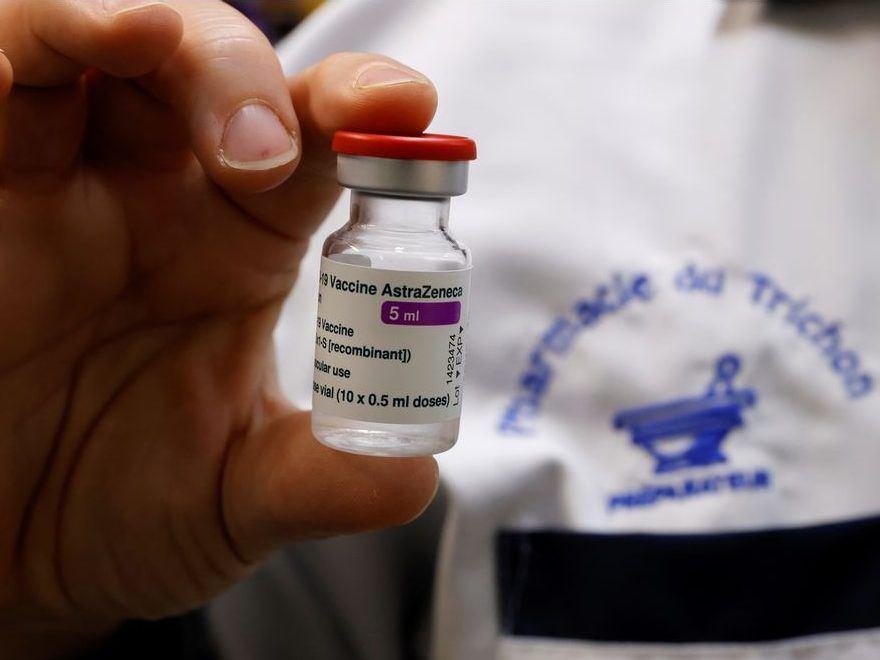
 torontosun.com
torontosun.com
Author of the article:Reuters
Reuters
Publishing date:Mar 15, 2021 • 4 hours ago • < 1 minute read • comment bubbleJoin the conversation
A pharmacist holds a vial of the AstraZeneca COVID-19 vaccine in a pharmacy in Roubaix as part of the coronavirus disease (COVID-19) vaccination campaign in France, March 15, 2021.
A pharmacist holds a vial of the AstraZeneca COVID-19 vaccine in a pharmacy in Roubaix as part of the coronavirus disease (COVID-19) vaccination campaign in France, March 15, 2021. PHOTO BY PASCAL ROSSIGNOL /REUTERS
Article content
PARIS — France will stop administering AstraZeneca’s COVID-19 vaccine pending an assessment by the European Union’s medicine regulator due on Tuesday, French President Emmanuel Macron said on Monday.
Macron said the EMA regulator was expected to give guidance on Tuesday afternoon after a number of countries suspended use of the AstraZeneca shot.
“The decision which has been taken out of precaution is to suspend vaccinating with the AstraZeneca vaccine in the hope that we can resume quickly if the EMA gives the green light,” Macron told a press conference with Spain’s prime minister.
“We are therefore suspending its use until tomorrow afternoon.”

Germany, Italy, France suspend AstraZeneca shots amid safety fears
BERLIN/GENEVA — Germany, France and Italy said on Monday they would suspend AstraZeneca COVID-19 shots after several countries reported possible serious side-effect…
'A PERFECT FORMULA': Unmasked spring breakers descend on Florida
Author of the article:Washington Post
Washington Post
Hannah Sampson, The Washington Post
Publishing date:Mar 15, 2021 • 2 hours ago • 4 minute read • comment bubbleJoin the conversation
Revelers flock to the beach to celebrate spring break, amid the COVID-19 outbreak in Miami Beach March 6, 2021. REUTERS/Marco Bello/File Photo ORG XMIT: FW1
Revelers flock to the beach to celebrate spring break, amid the COVID-19 outbreak in Miami Beach March 6, 2021. REUTERS/Marco Bello/File Photo ORG XMIT: FW1 PHOTO BY MARCO BELLO /REUTERS
Article content
After the fledgling pandemic forced an early end to Florida’s annual spring break bacchanal in 2020, the state is wide open this time around and – for some – irresistible.
Walt Disney World’s four parks, operating at reduced capacity, have no more tickets available through March 25. Photos from popular beach destinations this month have shown large, occasionally raucous crowds of unmasked revelers. Over the weekend, Miami Beach police arrested 100 and pepper sprayed “unruly” spring breakers.
Flights are cheap. Travel restrictions are nonexistent, and the state reopened its economy months ago.
Public health experts point out that spring break visitors are likely to be young and unvaccinated – and participants in high-risk behavior like hanging out in bars and packed clubs.
“It’s a perfect formula for spreading the disease,” said Eric Toner, a senior scholar with the Johns Hopkins Center for Health Security. “Even though we’re doing much better now than we were several months ago with the incidence of COVID-19, we’re still at a level nationally that last summer we would have thought was alarmingly high.”
Advertisement
STORY CONTINUES BELOW
This advertisement has not loaded yet, but your article continues below.
Article content
The crowds descend as Florida has added another 31,603 coronavirus cases and 605 deaths in the past seven days, according to data from the Centers for Disease Control and Prevention. The agency said the state also leads the nation in reported cases caused by the variants that were first identified in the United Kingdom and Brazil.
“The state has relaxed nearly all of its restrictions and containment measures,” Toner said. “And so there’s every reason to think that there’ll be high rates of transmission.”
For Miami Beach Mayor Dan Gelber, that all adds up to a “challenging” situation.
“People are coming here, I think, with the view that anything goes and that they haven’t been able to let loose in a year,” he said. “So why not come to the famous Miami Beach? It’s just not gonna work if that’s what they’re coming for.”
Across the state – a permissive place with no testing or quarantine requirements for visitors, no state mask mandate, and only some local restrictions on bars and restaurants – leaders in popular destinations are preparing for visitors with extra police, covid safety reminders and a smattering of new rules. While tourist numbers aren’t expected to reach pre-pandemic levels, especially since many universities have canceled spring break, destinations are still expecting a busy few weeks.
Spring break tourists from New Jersey enjoy the beach in Miami March 19, 2020.
Spring break tourists from New Jersey enjoy the beach in Miami March 19, 2020. PHOTO BY MARIA ALEJANDRA CARDONA /REUTERS
Panama City Beach is restricting crowds to 125 people for events on the beach in March and closing a section of the sand at night in April, according to the Panama City News Herald. A Fort Lauderdale bar is limiting out-of-state visitors to age 23 and older this month. Miami Beach is putting capacity limits on some beaches and banning coolers, inflatable devices and tents on the sand.
Advertisement
STORY CONTINUES BELOW
This advertisement has not loaded yet, but your article continues below.
Article content
Gelber said Friday that the city has “goodwill ambassadors” handing out masks, and police have made hundreds of arrests since this past month. Officials have been closing businesses that violate noise orders. Over the weekend, police body-slammed a man and shot pepper balls and pepper spray into a crowd that had formed around officers who were making an arrest; two officers were taken to the hospital. The city’s message for visitors is “vacation responsibly or be arrested.”
“I’m definitely not the mayor in Jaws,” Gelber said. “I have to be honest with the community because it is a health and safety issue. I don’t want our city to be a super spreader. I don’t want our residents to have to worry and I don’t want other communities to have to worry.”
And in the St. Pete/Clearwater area on the Gulf Coast, tourism promoters are trying to encourage safe behavior by dangling potential rewards. They are asking travelers to sign a pledge to wear a mask, keep a safe distance, wash their hands, and be patient and kind to hotel and restaurant workers, with the chance of winning a beach getaway. In popular tourist spots, “Sunshine Stewards” are handing out $25 gift cards to local businesses when they spot people following safety precautions.
Steve Hayes, the CEO of Visit St. Pete/Clearwater, said the goal is to protect the local community while also reassuring visitors that they would be safe on vacation.
“Let’s help people understand what we’re doing here and what things are in place … so that it can be safe for everybody – and then appeal to their sense of personal responsibility to make that happen,” he said.
Advertisement
STORY CONTINUES BELOW
This advertisement has not loaded yet, but your article continues below.
Article content
Cities don’t have much of a choice beyond relying on visitors to do the right thing. Gov. Ron DeSantis, a Republican, has blocked city and county leaders from enforcing their own mask mandates. The state lifted capacity restrictions for restaurants, bars, clubs, entertainment venues and other businesses in September, and said public beaches should remain open.
Last year on March 19, the governor said in an interview with Fox & Friends that “the party’s over in Florida.”
That message would be unthinkable for a second year in a row, said Bob Rountree, co-founder of Florida Rambler, a site that covers outdoor recreation.
“It’s not possible. There would be a march on the Capitol in Tallahassee,” he said. “The economy of Florida is tourism.”
MORE ON THIS TOPIC
An employee cleans the grounds behind the closed gates of Disneyland Park on the first day of the closure of Disneyland and Disney California Adventure theme parks on March 14, 2020.
Disneyland, other California theme parks get go-ahead for limited reopening April 1
Masks are for losers! Tampa fans whoop it up after the Bucs Super Bowl win.
HUNTER: Florida fans crucify 'commie' columnist
Spring break tourists from New Jersey enjoy the beach in Miami March 19, 2020.
HUNTER: Florida resident calls state COVID 'ticking time bomb'
Indeed, in a recent news conference, DeSantis reiterated his welcoming stance.
“Florida’s open,” he said. “And people can make decisions based on information.”
Mary Jo Trepka, the chair of the department of epidemiology at Florida International University, wants people to have the right information. She said that while numbers have been decreasing since highs in January, they are still not ideal, with Miami-Dade seeing about 1,000 new cases a day.
“People think this is behind us, but it’s not,” she said.
She urged anyone in Florida to avoid large groups and especially places where people aren’t wearing masks.
“People should spread out,” she said. “If people want to enjoy Florida, do it outdoors.”
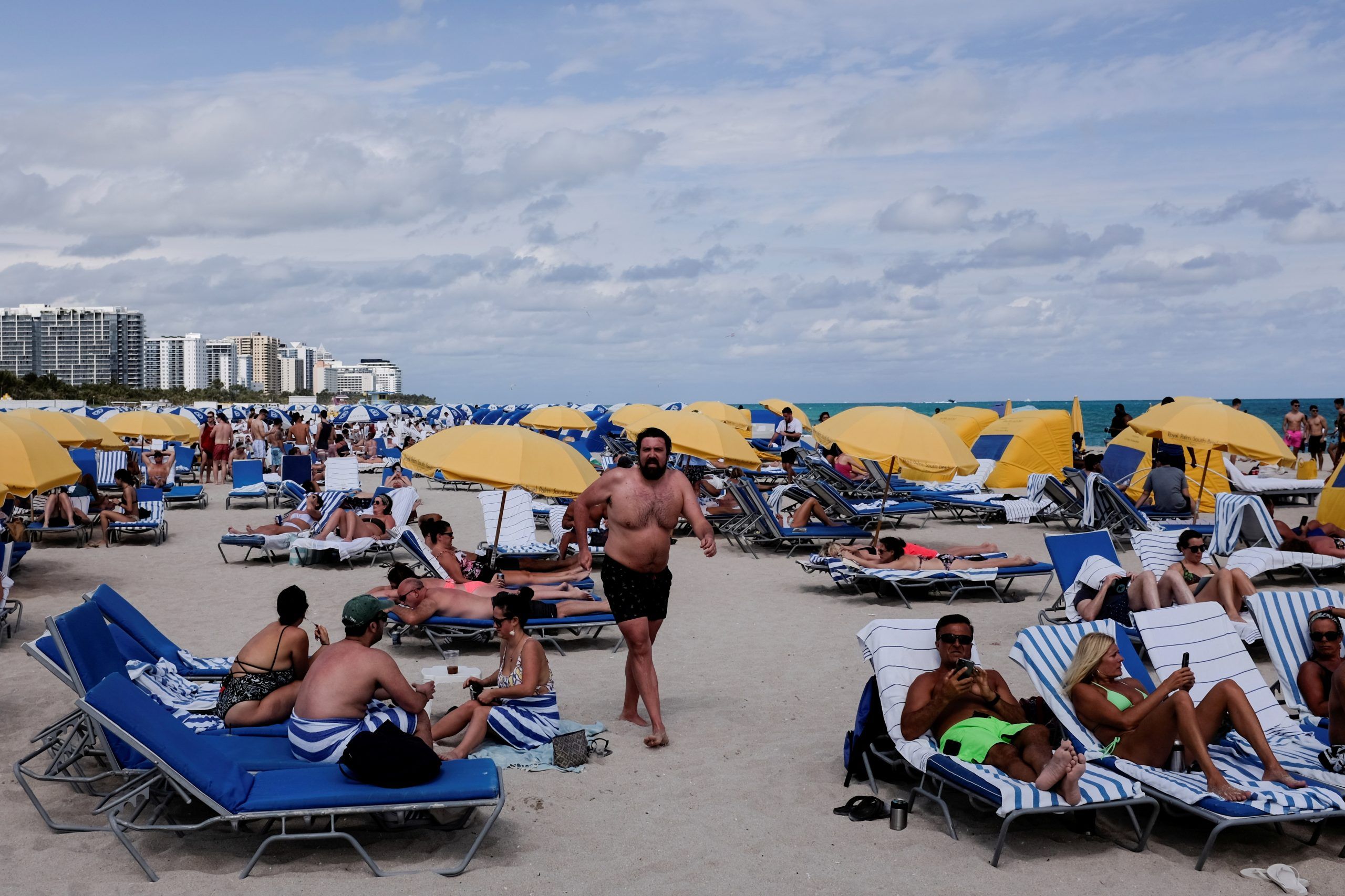
 torontosun.com
torontosun.com
Author of the article:Washington Post
Washington Post
Hannah Sampson, The Washington Post
Publishing date:Mar 15, 2021 • 2 hours ago • 4 minute read • comment bubbleJoin the conversation
Revelers flock to the beach to celebrate spring break, amid the COVID-19 outbreak in Miami Beach March 6, 2021. REUTERS/Marco Bello/File Photo ORG XMIT: FW1
Revelers flock to the beach to celebrate spring break, amid the COVID-19 outbreak in Miami Beach March 6, 2021. REUTERS/Marco Bello/File Photo ORG XMIT: FW1 PHOTO BY MARCO BELLO /REUTERS
Article content
After the fledgling pandemic forced an early end to Florida’s annual spring break bacchanal in 2020, the state is wide open this time around and – for some – irresistible.
Walt Disney World’s four parks, operating at reduced capacity, have no more tickets available through March 25. Photos from popular beach destinations this month have shown large, occasionally raucous crowds of unmasked revelers. Over the weekend, Miami Beach police arrested 100 and pepper sprayed “unruly” spring breakers.
Flights are cheap. Travel restrictions are nonexistent, and the state reopened its economy months ago.
Public health experts point out that spring break visitors are likely to be young and unvaccinated – and participants in high-risk behavior like hanging out in bars and packed clubs.
“It’s a perfect formula for spreading the disease,” said Eric Toner, a senior scholar with the Johns Hopkins Center for Health Security. “Even though we’re doing much better now than we were several months ago with the incidence of COVID-19, we’re still at a level nationally that last summer we would have thought was alarmingly high.”
Advertisement
STORY CONTINUES BELOW
This advertisement has not loaded yet, but your article continues below.
Article content
The crowds descend as Florida has added another 31,603 coronavirus cases and 605 deaths in the past seven days, according to data from the Centers for Disease Control and Prevention. The agency said the state also leads the nation in reported cases caused by the variants that were first identified in the United Kingdom and Brazil.
“The state has relaxed nearly all of its restrictions and containment measures,” Toner said. “And so there’s every reason to think that there’ll be high rates of transmission.”
For Miami Beach Mayor Dan Gelber, that all adds up to a “challenging” situation.
“People are coming here, I think, with the view that anything goes and that they haven’t been able to let loose in a year,” he said. “So why not come to the famous Miami Beach? It’s just not gonna work if that’s what they’re coming for.”
Across the state – a permissive place with no testing or quarantine requirements for visitors, no state mask mandate, and only some local restrictions on bars and restaurants – leaders in popular destinations are preparing for visitors with extra police, covid safety reminders and a smattering of new rules. While tourist numbers aren’t expected to reach pre-pandemic levels, especially since many universities have canceled spring break, destinations are still expecting a busy few weeks.
Spring break tourists from New Jersey enjoy the beach in Miami March 19, 2020.
Spring break tourists from New Jersey enjoy the beach in Miami March 19, 2020. PHOTO BY MARIA ALEJANDRA CARDONA /REUTERS
Panama City Beach is restricting crowds to 125 people for events on the beach in March and closing a section of the sand at night in April, according to the Panama City News Herald. A Fort Lauderdale bar is limiting out-of-state visitors to age 23 and older this month. Miami Beach is putting capacity limits on some beaches and banning coolers, inflatable devices and tents on the sand.
Advertisement
STORY CONTINUES BELOW
This advertisement has not loaded yet, but your article continues below.
Article content
Gelber said Friday that the city has “goodwill ambassadors” handing out masks, and police have made hundreds of arrests since this past month. Officials have been closing businesses that violate noise orders. Over the weekend, police body-slammed a man and shot pepper balls and pepper spray into a crowd that had formed around officers who were making an arrest; two officers were taken to the hospital. The city’s message for visitors is “vacation responsibly or be arrested.”
“I’m definitely not the mayor in Jaws,” Gelber said. “I have to be honest with the community because it is a health and safety issue. I don’t want our city to be a super spreader. I don’t want our residents to have to worry and I don’t want other communities to have to worry.”
And in the St. Pete/Clearwater area on the Gulf Coast, tourism promoters are trying to encourage safe behavior by dangling potential rewards. They are asking travelers to sign a pledge to wear a mask, keep a safe distance, wash their hands, and be patient and kind to hotel and restaurant workers, with the chance of winning a beach getaway. In popular tourist spots, “Sunshine Stewards” are handing out $25 gift cards to local businesses when they spot people following safety precautions.
Steve Hayes, the CEO of Visit St. Pete/Clearwater, said the goal is to protect the local community while also reassuring visitors that they would be safe on vacation.
“Let’s help people understand what we’re doing here and what things are in place … so that it can be safe for everybody – and then appeal to their sense of personal responsibility to make that happen,” he said.
Advertisement
STORY CONTINUES BELOW
This advertisement has not loaded yet, but your article continues below.
Article content
Cities don’t have much of a choice beyond relying on visitors to do the right thing. Gov. Ron DeSantis, a Republican, has blocked city and county leaders from enforcing their own mask mandates. The state lifted capacity restrictions for restaurants, bars, clubs, entertainment venues and other businesses in September, and said public beaches should remain open.
Last year on March 19, the governor said in an interview with Fox & Friends that “the party’s over in Florida.”
That message would be unthinkable for a second year in a row, said Bob Rountree, co-founder of Florida Rambler, a site that covers outdoor recreation.
“It’s not possible. There would be a march on the Capitol in Tallahassee,” he said. “The economy of Florida is tourism.”
An employee cleans the grounds behind the closed gates of Disneyland Park on the first day of the closure of Disneyland and Disney California Adventure theme parks on March 14, 2020.
Disneyland, other California theme parks get go-ahead for limited reopening April 1
Masks are for losers! Tampa fans whoop it up after the Bucs Super Bowl win.
HUNTER: Florida fans crucify 'commie' columnist
Spring break tourists from New Jersey enjoy the beach in Miami March 19, 2020.
HUNTER: Florida resident calls state COVID 'ticking time bomb'
Indeed, in a recent news conference, DeSantis reiterated his welcoming stance.
“Florida’s open,” he said. “And people can make decisions based on information.”
Mary Jo Trepka, the chair of the department of epidemiology at Florida International University, wants people to have the right information. She said that while numbers have been decreasing since highs in January, they are still not ideal, with Miami-Dade seeing about 1,000 new cases a day.
“People think this is behind us, but it’s not,” she said.
She urged anyone in Florida to avoid large groups and especially places where people aren’t wearing masks.
“People should spread out,” she said. “If people want to enjoy Florida, do it outdoors.”

'A PERFECT FORMULA': Unmasked spring breakers descend on Florida
Flights are cheap. Travel restrictions are nonexistent, and the state reopened its economy months ago.
S2021 E3112103/11/21
COVID: One Year Later
One year after COVID-19 was declared a global pandemic, Lester Holt and Savannah Guthrie cover vaccines, the future of travel, how small businesses are coping, and a path to regaining normalcy.
Available until 09/22/21
Appearing:
Tags: news, Crime, murder, Mystery, Lester Holt, Josh Mankiewicz, keith morrison, Dennis Murphy, Andrea Canning
S2021 E3112141 minFull EpisodeNews and InformationPrimetime
 nbc.com
nbc.com
COVID: One Year Later
One year after COVID-19 was declared a global pandemic, Lester Holt and Savannah Guthrie cover vaccines, the future of travel, how small businesses are coping, and a path to regaining normalcy.
Available until 09/22/21
Appearing:
Tags: news, Crime, murder, Mystery, Lester Holt, Josh Mankiewicz, keith morrison, Dennis Murphy, Andrea Canning
S2021 E3112141 minFull EpisodeNews and InformationPrimetime
Watch Dateline Episode: COVID: One Year Later - NBC.com
Watch COVID: One Year Later (Season 2021, Episode 31121) of Dateline or get episode details on NBC.com
The precautionary principle kills
The decision of EU states to suspend the use of the AstraZeneca vaccine is not cautious – it’s dangerous.

The EU seems determined to make a complete mess of rolling out the vaccines against Covid-19. The latest bout of stupidity is the decision by several countries to suspend the use of the Oxford / AstraZeneca (AZ) vaccine.
First, a quick recap. Last summer, several EU member states decided to start negotiations on securing supplies of the AZ and Pfizer vaccines. However, this can-do approach was quickly snuffed out in favour of an EU-led approach. After months of wrangling, deals with AZ and Pfizer were put in place far too late. In addition, EU medicines regulators took far longer to approve the vaccines than elsewhere, only giving the green light to Pfizer in late December and AZ at the end of January.
Then there was an almighty spat between the EU and AZ over supplies. While the UK was ramping up its vaccine programme, the EU was fuming at AZ’s warning that there were production problems, leading to a temporary shortfall. Things got so bad that the Commission unilaterally decided that it would effectively tear up the Northern Ireland Protocol on the off chance that some vaccine doses might get to the UK via Ireland – a decision that was swiftly reversed.
In January, a German newspaper, Handelsblatt, caused ructions by claiming that ‘the AZ vaccine apparently has an effectiveness of only eight per cent in the elderly’. ‘The government’s vaccination strategy is shaky’, it argued. The eight-per-cent figure had apparently come from Germany’s health ministry, although some claimed this was just a misunderstanding. That didn’t stop French president Emmanuel Macron from claiming the vaccine was ‘quasi-effective’ for over-65s.
It also didn’t help that German chancellor Angela Merkel was wrongly reported to have refused to have the AZ vaccine. (At 67, she was just in the wrong age group.)
After all this fuss, few could be surprised that vast numbers of Europeans refused to have the AZ vaccine. Continuing the schizophrenic approach, Italy then blocked the export of 250,000 doses of the AZ vaccine destined for Australia. This ‘love you, hate you’ behaviour is more akin to a teenage love affair than the serious matter of dealing with a pandemic.
Now, just to put the tin lid on this mess, several EU countries have decided to suspend use of the AZ vaccine in response to claims that it may be linked to an increased risk of blood clots. German health authorities have not covered themselves in glory on the issue. On Friday, health minister Jens Spahn said: ‘I regret that … some countries in the European Union have suspended vaccination with AstraZeneca. From what we know so far, the benefit… is far greater than the risk.’ By Monday, the government had decided to suspend use of the vaccine.
What is amazing is the paucity of evidence about an elevated risk of blood clots after taking the vaccine. It seems to be a classic example of the post hoc ergo propter hoc fallacy. Basically, just because B follows A does not mean that A caused B. In this case, Denmark was first to suspend the use of the AZ vaccine last week due to reports of clotting, including one fatal case. Other countries, including Norway and Iceland, quickly followed suit.
However, AstraZeneca has been quick to point out that there is no evidence of a problem. Yes, there have been cases of blood clots, but there don’t appear to be any more than one might expect. As David Spiegelhalter has pointed out, the European Medicines Agency says there have been 30 ‘thromboembolic events’ following around five million vaccinations. But, he notes, ‘Deep-vein thromboses (DVTs) happen to around one person per 1,000 each year, and probably more in the older population being vaccinated’.
Looking more broadly at the side effects from the vaccines, he concludes that ‘these vaccines have shown themselves to be extraordinarily safe’. He compares the logic to the misplaced scares around MMR and autism, which have led to many parents rejecting another safe vaccine. Of course, we should monitor the data in case a risk does arise – which is why we have a reporting system for side effects – but the data so far do not justify such extreme action.
So what is with the madness? EU countries are almost all way behind the UK and the US in vaccinating their populations. Supplies are thin on the ground, with every dose urgently needed. Yet they have chosen to reject, at least temporarily, an effective and safe vaccine.
The clue is in an idea that has dominated EU policymaking for decades: the precautionary principle. This suggests that precautionary action should be considered ‘even before a causal link has been established by absolutely clear scientific evidence’. That’s fine as long as the action taken has no downsides. But it’s mad when there is a clear and present danger to taking that action. In this case, refusing to use one kind of vaccine would be fine if there were plentiful supplies of alternatives or no health emergency. But evidence of the vaccine’s harm is still thin, bordering on non-existent, while Covid-19 is still killing far too many people.
Ireland’s deputy chief medical officer said on Sunday: ‘It has not been concluded that there is any link between the [AstraZeneca vaccine] and these cases. However, acting on the precautionary principle, and pending receipt of further information, the NIAC [National Immunisation Advisory Committee] has recommended the temporary deferral of the… AstraZeneca vaccination programme in Ireland.’
Even if this suspension comes to an end and the AZ vaccine comes back into use, it will be no surprise if many people are hesitant about accepting it. The whole vaccination programme will be slowed down, more people will die and lockdowns will remain in place for longer. It’s hard not to wonder if there is a political element to all this – an attempt in some quarters to justify the EU’s vaccine failures by finding fault with a vaccine that was developed elsewhere. But even on the face of it, the decision to stop using the AZ vaccine is nuts.
You don’t have to be a Union flag-waving patriot, proudly extolling the virtues of a vaccine developed in the UK, to think this is all bonkers. Indeed, the gushing discussion last year of the development of the Oxford vaccine, as it has been called routinely, was a bit grating. This is not about national pride – it’s about looking across to the continent, shaking your head, and wondering what on earth the authorities are thinking.
For once, the UK has managed to dodge this nonsense, with almost 46 per cent of all adults now having had at least one dose of either the AZ or Pfizer vaccine. (Three per cent have now had both doses.) With the chaos on the continent, it’s another good reason to be thankful for Brexit.

 www.spiked-online.com
www.spiked-online.com
The decision of EU states to suspend the use of the AstraZeneca vaccine is not cautious – it’s dangerous.

ROB LYONS
COLUMNIST
15th March 2021
SpikedThe EU seems determined to make a complete mess of rolling out the vaccines against Covid-19. The latest bout of stupidity is the decision by several countries to suspend the use of the Oxford / AstraZeneca (AZ) vaccine.
First, a quick recap. Last summer, several EU member states decided to start negotiations on securing supplies of the AZ and Pfizer vaccines. However, this can-do approach was quickly snuffed out in favour of an EU-led approach. After months of wrangling, deals with AZ and Pfizer were put in place far too late. In addition, EU medicines regulators took far longer to approve the vaccines than elsewhere, only giving the green light to Pfizer in late December and AZ at the end of January.
Then there was an almighty spat between the EU and AZ over supplies. While the UK was ramping up its vaccine programme, the EU was fuming at AZ’s warning that there were production problems, leading to a temporary shortfall. Things got so bad that the Commission unilaterally decided that it would effectively tear up the Northern Ireland Protocol on the off chance that some vaccine doses might get to the UK via Ireland – a decision that was swiftly reversed.
In January, a German newspaper, Handelsblatt, caused ructions by claiming that ‘the AZ vaccine apparently has an effectiveness of only eight per cent in the elderly’. ‘The government’s vaccination strategy is shaky’, it argued. The eight-per-cent figure had apparently come from Germany’s health ministry, although some claimed this was just a misunderstanding. That didn’t stop French president Emmanuel Macron from claiming the vaccine was ‘quasi-effective’ for over-65s.
It also didn’t help that German chancellor Angela Merkel was wrongly reported to have refused to have the AZ vaccine. (At 67, she was just in the wrong age group.)
After all this fuss, few could be surprised that vast numbers of Europeans refused to have the AZ vaccine. Continuing the schizophrenic approach, Italy then blocked the export of 250,000 doses of the AZ vaccine destined for Australia. This ‘love you, hate you’ behaviour is more akin to a teenage love affair than the serious matter of dealing with a pandemic.
Now, just to put the tin lid on this mess, several EU countries have decided to suspend use of the AZ vaccine in response to claims that it may be linked to an increased risk of blood clots. German health authorities have not covered themselves in glory on the issue. On Friday, health minister Jens Spahn said: ‘I regret that … some countries in the European Union have suspended vaccination with AstraZeneca. From what we know so far, the benefit… is far greater than the risk.’ By Monday, the government had decided to suspend use of the vaccine.
What is amazing is the paucity of evidence about an elevated risk of blood clots after taking the vaccine. It seems to be a classic example of the post hoc ergo propter hoc fallacy. Basically, just because B follows A does not mean that A caused B. In this case, Denmark was first to suspend the use of the AZ vaccine last week due to reports of clotting, including one fatal case. Other countries, including Norway and Iceland, quickly followed suit.
However, AstraZeneca has been quick to point out that there is no evidence of a problem. Yes, there have been cases of blood clots, but there don’t appear to be any more than one might expect. As David Spiegelhalter has pointed out, the European Medicines Agency says there have been 30 ‘thromboembolic events’ following around five million vaccinations. But, he notes, ‘Deep-vein thromboses (DVTs) happen to around one person per 1,000 each year, and probably more in the older population being vaccinated’.
Looking more broadly at the side effects from the vaccines, he concludes that ‘these vaccines have shown themselves to be extraordinarily safe’. He compares the logic to the misplaced scares around MMR and autism, which have led to many parents rejecting another safe vaccine. Of course, we should monitor the data in case a risk does arise – which is why we have a reporting system for side effects – but the data so far do not justify such extreme action.
So what is with the madness? EU countries are almost all way behind the UK and the US in vaccinating their populations. Supplies are thin on the ground, with every dose urgently needed. Yet they have chosen to reject, at least temporarily, an effective and safe vaccine.
The clue is in an idea that has dominated EU policymaking for decades: the precautionary principle. This suggests that precautionary action should be considered ‘even before a causal link has been established by absolutely clear scientific evidence’. That’s fine as long as the action taken has no downsides. But it’s mad when there is a clear and present danger to taking that action. In this case, refusing to use one kind of vaccine would be fine if there were plentiful supplies of alternatives or no health emergency. But evidence of the vaccine’s harm is still thin, bordering on non-existent, while Covid-19 is still killing far too many people.
Ireland’s deputy chief medical officer said on Sunday: ‘It has not been concluded that there is any link between the [AstraZeneca vaccine] and these cases. However, acting on the precautionary principle, and pending receipt of further information, the NIAC [National Immunisation Advisory Committee] has recommended the temporary deferral of the… AstraZeneca vaccination programme in Ireland.’
Even if this suspension comes to an end and the AZ vaccine comes back into use, it will be no surprise if many people are hesitant about accepting it. The whole vaccination programme will be slowed down, more people will die and lockdowns will remain in place for longer. It’s hard not to wonder if there is a political element to all this – an attempt in some quarters to justify the EU’s vaccine failures by finding fault with a vaccine that was developed elsewhere. But even on the face of it, the decision to stop using the AZ vaccine is nuts.
You don’t have to be a Union flag-waving patriot, proudly extolling the virtues of a vaccine developed in the UK, to think this is all bonkers. Indeed, the gushing discussion last year of the development of the Oxford vaccine, as it has been called routinely, was a bit grating. This is not about national pride – it’s about looking across to the continent, shaking your head, and wondering what on earth the authorities are thinking.
For once, the UK has managed to dodge this nonsense, with almost 46 per cent of all adults now having had at least one dose of either the AZ or Pfizer vaccine. (Three per cent have now had both doses.) With the chaos on the continent, it’s another good reason to be thankful for Brexit.

The precautionary principle kills
The decision of EU states to suspend the use of the AstraZeneca vaccine is not cautious – it’s dangerous.



